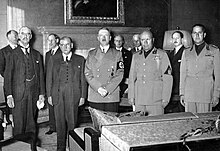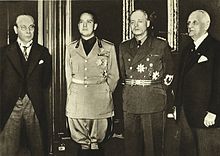Galeazzo Ciano
 |
This article's content is marked as Mature The page Galeazzo Ciano contains mature content that may include coarse language, sexual references, and/or graphic violent images which may be disturbing to some. Mature pages are recommended for those who are 18 years of age and older. If you are 18 years or older or are comfortable with graphic material, you are free to view this page. Otherwise, you should close this page and view another page. |
| “ | Victory finds a hundred fathers while no one wants to acknowledge the failure. | „ |
| ~ Galeazzo Ciano |
Gian Galeazzo Ciano, better known as Galeazzo, count of Cortellazzo and Buccari, was an Italian diplomat and politician.
Biography[edit]
Birth and early life[edit]
Galeazzo was born on the 18th March 1903 in Livorno, Tuscany, Italy, by Admiral Costanzo Ciano. During the First World War he moved with his family to Venice, where he attended the "Marco Polo" high school. Later he moved to Genoa, where he obtained the classical high school diploma. During his university studies, he practiced journalism at "Il Nuovo Paese", "La Tribuna" and "L'Impero", an intransigent fascist organ, however, dealing not with politics, but with theater criticism. After earning his law degree, he was admitted to diplomacy and sent as an embassy clerk in Rio de Janeiro. On the 24th April 1930 he married Edda Mussolini, with whom he immediately left for Shanghai as consul.
First years of Fascist Italy[edit]
After he returned to Italy, on the 1st August 1933 he was appointed head of the press office by Mussolini for the control and guidance of the mass media with the title of undersecretary for the press and culture.
In 1935, he became Minister of Press and Propaganda, then he volunteered for the war in Ethiopia, where he distinguished himself as a bomber pilot, in command of the 15th Caproni bombing squadron and was decorated. In 1936, he was appointed Minister of Foreign Affairs, taking over from Mussolini himself. Then, he gained some confidence with the son of Victor Emmanuel III, Umberto II of Savoy. Ciano kept Italy away from Hitler's Germany for as long as possible, with the help of the ambassador to Berlin, Bernardo Attolico. Ciano clearly perceived the danger that Hitler represented also for Italy, when the Nazis killed the Austrian Prime Minister Dollfuss, that had had close ties withMussolini's family. Following a series of meetings with Joachim von Ribbentrop and Hitler which led to the signing of the Pact of Steel on the 22th May 1939, Ciano, practically forced by his father-in-law, consolidated his doubts about the allied nation and had several differences with his father-in-law.
On the 23rd March 1939, Ciano became National Councilor of the Chamber of Fasci and Corporations and on the 26th June 1939, his father Costanzo Ciano, president of the Chamber of Fasci and Corporations, died while he was at a dinner with friends.
During the kingdom of Albania[edit]
The Germans conquered Czechoslovakia and established the protectorate of Bohemia and Moravia there. Ciano noted that Mussolini reacted with anger to the news of the German conquests and that he was particularly shocked by the enthusiastic communications that Hitler sent him, judging them "irritating". This thing showed the superiority of the Germans over the Italians and this angered Benito Mussolini a lot. So, Ciano personally organized the operation to conquer Albania. So, on the 7th April 1939, Italy had invaded and shortly after conquered the Kingdom of Albania.
The government of Albania was entrusted to the king's lieutenant, Francesco Jacomoni di San Savino, who maintained it until the 8th September 1943. It was a front government, with Albanian ministers flanked by Italian councilors with countersigning powers. Regarding the role of Ciano in the Albanian affair, he is commonly considered the true "regent" of the colony, and also in Italian historiography he is often mentioned as "viceroy", since in fact he had to conduct himself as such. The discovery and promotion of the suppression of the Ministry of Foreign Affairs and of the Defense of Tirana indicate the centrality of his role and also the constitution of the Albanian Fascist Party, urged by Achille Starace as early as April, was subjected to the authorization of Ciano.
On the 13th April 1939, Ciano immediately turned to the Albanians as the direct manager of their nation, assuring them that their national aspirations would be supported by Italy also in relation to the expansion of the borders, a question that in practice referred to the recovery of the areas allegedly "Albanians" in the Greek and Yugoslav territories; being the proclamations directed to the Albanian Ministry of Foreign Affairs a source of concern for the neighboring countries, Ciano hastened to report (a week later, in Venice) the Italian lack of interest in the subject and the instrumentality of the declarations. Nonetheless, he had a Special Office for Irredentism established which, among its non-obvious tasks, also had that of preparing an underground military structure for the moment, believed to be not far away, in which a crisis in Yugoslavia had erupted. It has been asserted by many sources that coinciding in time with the annexation, Ciano's personal fortunes grew as obscurely as rapidly.
Role in World War II[edit]
On the 10th June 1940, Major Ciano was commander of CV Gruppo S.M.79 of the 46th Wing of Pisa-San Giusto Airport. At the beginning of the Second World War, when his anti-German positions were by now known, many observers believe that Ciano's greatest influence was in the formulation of "non-belligerence" on the one hand he did not agree in attacking, on the other he did not disagree with the aggressor. This soft and ambiguous situation had been reached with an intuition of his, which resulted in the sending of a famous letter to Hitler in which an incredible amount of means and armaments was asked from Germany and in the face of this request the Nazis relaxed the pressure, at least to a bit'. Ciano had quietly urged the military leaders not to make "criminal optimism" in drawing up their shopping list.
When Italy entered the war, it was Ciano who delivered the declarations to the ambassadors of France and the United Kingdom. A few months later he was the creator of the war on Greece. Considering that in Athens, governed by General Ioannis Metaxas, a military regime was in force that was not hostile to Italy and that, on the contrary, it showed sympathy towards the totalitarian formula and tried to learn from the Italian experience, Ciano believed that it would be another "useful and easy" operation. The invasion quickly turned into a military disaster that saw the Italian troops driven back to Albania, which was not taken into account. In fact, the Greeks had a reaction of pride and reacted to the attack with unexpected participation, repelling the Italians and also causing the resignation of Pietro Badoglio.
Faced with the difficulties that were encountered, Ciano did not take long to return to more dubious positions, expressing his perplexities both in the family and to other hierarchs. Also due to the positions held by him, with particular regard to relations with the United Kingdom, a more intense operational attendance led him to thicken the relationship with Dino Grandi, who remained the most independent exponent of the top of fascism.
In 1942 Victor Emannuel III appointed him Count of Buccari, in addition to the title of Count of Cortellazzo which had been conferred on his father Costanzo after the First World War. In the spring of 1943, Ciano was sent as ambassador to the Vatican. It was at this moment that his relationship with Monsignor Montini reached the greatest intensity, keeping the fascist regime in contact with all the main international powers, through the mediation of the influential prelate.
The fallen of Fascism[edit]
On the 25th July 1943, when the internal opposition led by Dino Grandi was finally about to defeat Mussolini, Ciano joined them. At the Grand Council of Fascism, in fact, he voted on Grandi's agenda (along with eighteen other hierarchs), thus approving the indication contained in the motion, aimed at ensuring that the king would take back the army and government of the country. In practice, Ciano's was a very heavy vote with irreversible consequences against his father-in-law. Ciano's optimistic forecasts were wrecked together with the disillusionment of Grandi who believed he had worked to hand over the command to the Italian Marshal Enrico Caviglia and who, instead, saw the parigrade, but unwelcome Badoglio, rise to power.
Later, he tried to make a protected exile for his family in the Vatican, but the Holy See refused to hide them. In August 1943, he fled to Munich, convinced that he would find there protection and a plane to Spain, ignoring that in the meantime Vittorio Mussolini, Roberto Farinacci and Alessandro Pavolini were accusing the traitors of fascism on the radio and in particular him, who became the main target.
The Verona's trial[edit]
Ciano was extradited to Italy at the explicit request of the newborn Republican Fascist Party on the 17th October 1943 to be jailed. During the trial the investigators treated Ciano almost with benevolence, fearing that Ciano would tell secret events, unwelcome to the fascist regime .After a swift public meeting Ciano was found guilty together with Marinelli, Gottardi, Pareschi and the old general Emilio De Bono. Furthermore, the Duce's son-in-law was the only accused to be sentenced to be shot unanimously.
The evening before the execution, Ciano refused to sign the pardon petition to the Duce, but then, pressed by his fellow prisoners, he ended up accepting. Pavolini, annoyed, spent the whole night looking for an official who would sign the rejection of the request for pardon. Everyone refused to sign and eventually found, or rather, forced a small official to sign against his will. However, Mussolini did not move to save his son-in-law.
Death[edit]
On the 11th January 1944, Ciano was executed at the Verona shooting range, together with the other four ex-hierarchs, tied to chairs and shot in the back as is customary for traitors. Before the shooting, he turned to the firing squad. Ciano did not die immediately: the shot, seated and from the back, offered a more difficult target for vital organs. The firing squad did not fire at close range and the final blow with two bullets to the head was necessary.
Gallery[edit]
Images[edit]
-
Cover of Galeazzo Ciano's diary.
-
Galeazzo Ciano's signature.
-
Adolf Hitler (on the center), Benito Mussolini (on the right) and Galeazzo Ciano (on the far-right).
-
Galeazzo Ciano (on the center-left) on the first Vienna Award negotiation.
-
1939, Benito Mussolini (on the left) with Chamberlain and Galeazzo Ciano (on the far-right).
-
1939, Galeazzo Ciano and Józef Beck.
-
Galeazzo Ciano with Dino Alfieri.
-
1936, Guido Schmidt, Galeazzo Ciano and Kurt von Schuschnigg.
Trivia[edit]
- He wrote the play "Felicità d'Amleto" with a single act called "Fondo d'oro".
- Galeazzo Ciano wrote diaries when he was still Minister of Foreign Affairs. He wrote them from 1936 until the 8th September 1943.
- He is portrayed in the videogame "The New Order: Last Days of Europe" as the new dictator of Italy.
- It was Herbert Kappler who captured Galeazzo Ciano.







